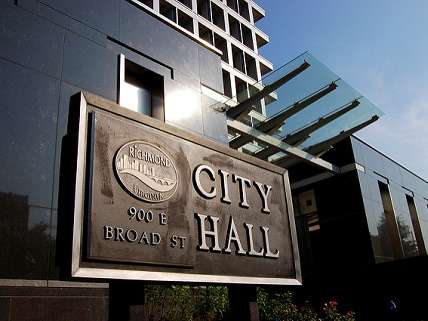A Deep Dive Into Dysfunction in City Government in Richmond
A review of the bureaucracy in the Virginia capital found what most people suspected, that City Hill stinks.

There's no reason to think Richmond is unusually worse (or better) than many other municipalities its size. Which is one reason the new performance review of the city's government merits attention, even by people who live elsewhere.
Mayor Levar Stoney ordered up the review soon after he took office in January, thereby keeping a promise to the voters. Consultants from the Wilder School of Government and Public Affairs at Virginia Commonwealth University released the report a few days ago. They confirm what most people suspected:
- "Excessive bureaucracy, micromanagement, unnecessary delays, and sometimes poor leadership have led to a system that is often not as agile… or as skillful as it should be."
- "Current or prospective employees perceive the weight of bureaucracy to be immobilizing."
- "An annual review of residents… reveals a stark decline in citizen's [sic] satisfaction with City government in the last eight years."
The review walks through City Hall department by department, cataloging the problems and recommending fixes. And just to be clear, it does find some bright spots.
For instance, "there are many employees who are actively engaged in thinking of ways to make the City a superior place. Responses were thoughtful, sometimes passionate, and heartfelt." The staff in the Office of Community Wealth Building are "entrepreneurial, action-oriented, and have innovative ideas." And: The Juvenile Detention Center, which once "had been shut down due to management and operational issues," is now "meeting or exceeding standards" and is "a model of progressive juvenile justice."
Unfortunately, those bright spots are exceptions. Much of the rest of city operations are a Sargasso Sea of red tape, obstruction, and dysfunction.
Departments don't talk to one another or respond to one another's inquiries—except to get in one another's way: If it's not Human Resources holding up badly needed new hires so long that the candidates take jobs elsewhere, it's the city attorney's office bogging down projects with lengthy and unneeded reviews.
Higher-ups don't communicate with people down the chain of command, except to deliver "edicts." Front-line workers pass decisions up the chain to avoid accountability. Decisions get passed from one administrative bailiwick to another to avoid responsibility—and potential blowback from the city council if something goes wrong.
Policies and procedures are often unclear—when they exist at all. (e.g., "Policies and procedures are not in place for many processes in the Finance Department.")
The city has "multiple IT departments … often with different policies and procedures." IT doesn't get notified of new hires, which leaves the new hires twiddling their thumbs. Systems in the Finance Department "are a source of inefficiency and frustration" owing to "poor implementation, out-of-date technology, and poor understanding… by users."
Systems in use by one department can't talk to systems in use by another. Procurement is a nightmare, with "a variety of legacy processes" that are "highly ineffective," "extensive paperwork and approvals needed to make small purchases," and a city attorney's office that "is considered a significant impediment to an efficient process."
Morale stinks. Nobody feels appreciated. And City Hall needs a good cleaning, in the most literal sense.
This isn't just unpleasant or inconvenient. It's holding the city back. When the Department of Economic Development can't get the job done, business goes elsewhere. When the Finance Department takes more than 45 days to cut a check, small entrepreneurs can't afford to do business with the city—no matter how much the Office of Minority Business tries to help.
And these conditions obtain despite the fact that Richmond spends more per resident than comparable Virginia cities in many areas. Of particular note: Richmond spends $273 per capita on general government administration. The state average is $159 for cities and $113 for counties. Yet many localities get high marks on leaner budgets. Neighboring Henrico routinely wins awards for municipal management, for instance.
Richmond is probably tired of that comparison. But it's going to keep hearing about it, unless Henrico gets much worse (unlikely) or Richmond gets much better.
The good news is that it can. And the consultants' report includes many suggestions toward that end: Update and integrate technology. Adopt best practices. Develop clear procedures. Give managers purchasing cards. Train people. Communicate.
Yet those reforms depend on another that might not be so easy: changing the culture. That word, "culture," shows up more than 30 times in the report. Again and again, the consultants refer to a lack of respect among employees, and a lack of any sense of urgency. City Hall, they say, needs to be "more customer-focused and results-oriented."
Stoney has four years to spend repairing the engine of governance in Richmond, and the report from VCU's Wilder School has given him a punch list more than long enough to fill up the time.
If he focuses on the job and keeps grinding away, he could turn the city around. To do that, though, he will need buy-in from the bureaucracy. Without that buy-in, he won't be able to turn around so much as a swivel chair. Because no matter how much energy and enthusiasm you have, you still can't push on a rope.
This column originally appeared at the Richmond Times-Dispatch.


Show Comments (26)